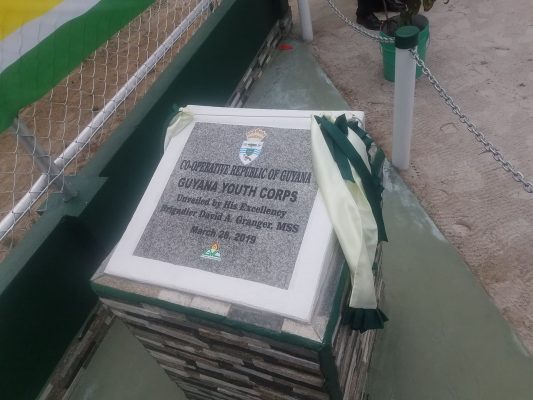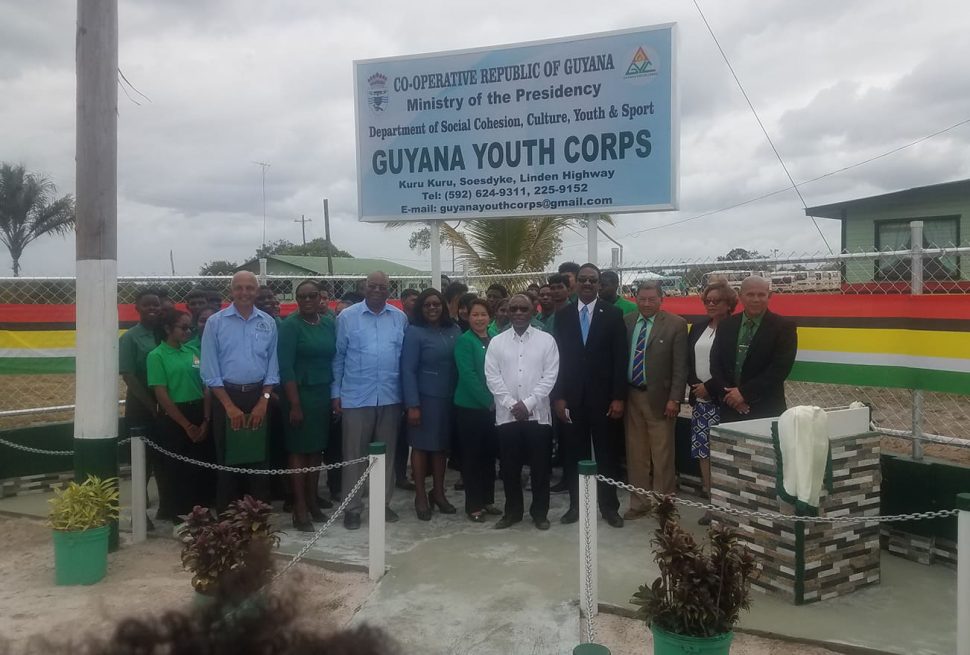The Guyana Youth Corps (GYC), which is expected to expand education and employment opportunities for young people, was yesterday officially relaunched at the Kuru Kuru Training Centre, at Soesdyke, Linden Highway.
The GYC, which falls under the supervision of the Ministry of the Presidency’s Department of Social Cohesion, Culture, Youth and Sport, is aimed at equipping school-leavers, including underprivileged youths who would have either dropped out or failed out of school without the needed qualifications and skills, to enter the world of work.
Present at the launch were President David Granger, Minister of Social Cohesion Dr. George Norton, Minister of Indigenous Peoples’ Affairs Sydney Allicock, Minister of Foreign Affairs Carl Greenidge, Minister of Education Nicolette Henry, Minister of Finance Winston Jordan, Minister of Communities Ronald Bulkan, and Speaker of the National Assembly Dr Barton Scotland.

President Granger, who had announced the plan to relaunch the GYC in 2017, delivered the feature address in which he noted that the idea came from the youths at the Kuru Kuru Training Centre. “It was in speaking with them that the idea came from them that this is what they really wanted to do, this is very meaningful. It was not a sideshow, it was central to their lives… so I’m very happy to be here and see them, they are the core of the corps,” he said.
The GYC was previously established by the then government in 1968 to address youth unemployment. Some 1,200 young people benefitted from the programme, which was later absorbed into the Guyana National Service.
President Granger noted that the new GYC, which is not a branch of the military service, is designed for young people who are no longer in the formal public education system. “It is a voluntary not compulsory, centralised institution open to school graduates and other youth interested in enhancing their knowledge, skills and attitudes,” he explained.
Granger also emphasised that it is the older generation’s obligation to ensure that youths receive the best possible preparation to enable them to inherit Guyana. “Guyana, if it is to fulfill its destiny as a land of opportunity and prosperity, must harness the potential of its majority, its young people. This country would falter if its youth flounders; it will remain poor and undeveloped as long as its youth remain poor and undeveloped,” he added, while later pointing out that the launch of the GYC is a signal to the youths that their efforts of self-advancement will be supported by the state.
Granger noted that against the background of the rising rates of school drop-outs, teenage pregnancy, migration rate of university graduates and youth incarceration, the National Youth Policy was drafted. The policy, he explained, articulates the government’s vision as “a nation in which young people are united, educated, trained, safe, happy, healthy and integrally involved in the decision making processes while enjoying equality of opportunities and equal access to the resources of our country and in which they are politically, economically and socially empowered.”
He later added that without equality, access to better education and expanded employment opportunities, the ‘Good Life’ which the government speaks of will be unattainable. “And when you speak with them, you’ll find out that they know what they want to do, they just want to have the means, and today we’re helping them with those means,” he said.
Empowerment
According to the president, education, equality, empowerment and employment are the pillars upon which the GYC stands. He added that education is the foundation of a good life. “Young people will succeed only if the performance of the public education sector is improved and we’re working on that. We have to increase the rate of matriculation; we have to reduce the primary and secondary school dropout rate,” he noted.
Granger stated that through various programmes like the Public Education Transport Service (PETS), which provides free transportation for children going to school, through the improved training of teachers and through increased access to the internet and other programmes, the government will be able to provide an efficient public education system for the youth.
“The youth corps is needed to help those students who fail or those who choose to leave the formal education system but are still unprepared or underequipped for the world of work,” he added.
Granger further said that the GYC will contribute to eradicating inequality, including geographic, gender and racial inequalities. “The disparity in opportunities between the coastland and the hinterland are well known. Similarly, those between urban and rural areas must be reduced and eventually eliminated if we are really to create one nation in this Guyana, a nation of equal people,” he added.
He further said that ensuring that girls and boys are given equal access to education and training will aid in closing the gender gap. “This campus at Kuru Kuru will foster greater inclusiveness among students from all regions of this country,” the president added.
Granger also noted that youth unemployment has led to “a haemorrhaging of precious human resources.” “Young people unable to find employment are inclined to migrate in search of more satisfying economic opportunities,” he observed.
As a result, he said the GYC will help to reverse the economic, human and social effects caused by youth unemployment. “The principal motivating factors for the establishment of the Guyana Youth Corps are the promotion of education, the reduction of inequality and unemployment and the expansion of employment opportunities for our young people. The youth corps is an initiative and an institution aimed at ensuring that our young people are equipped with the knowledge, skills and attitudes to become productive citizens,” he added.
Meanwhile, Norton, in his address, noted that the government has pioneered programmes built to empower the youth and the establishment of the GYC is another step in the right direction. “I must remind you that the programmes that have been established are specifically engineered to brighten the future of you, our Guyanese youths, but I beg you to remember that you are the ones responsible for actually securing a bright future for yourselves,” he added.
When Stabroek News caught up with Henry, she called the launching of the GYC a great initiative and step for the government. “What this represents in a large way is capturing those young people who are not eligible for employment, further education or training and so to have them in an institution that will provide that level of training and proprietary work so that they can be prepared, whether they want to enter the world of work or to continue training or to be entrepreneurs and be their own bosses,” Henry said.
One of the participants from one of the GYC programmes stated that she was happy to be a part of the initiative. “This environment is very enjoyable, fun and adventurous,” she said, while adding that she has had fun learning so far.






